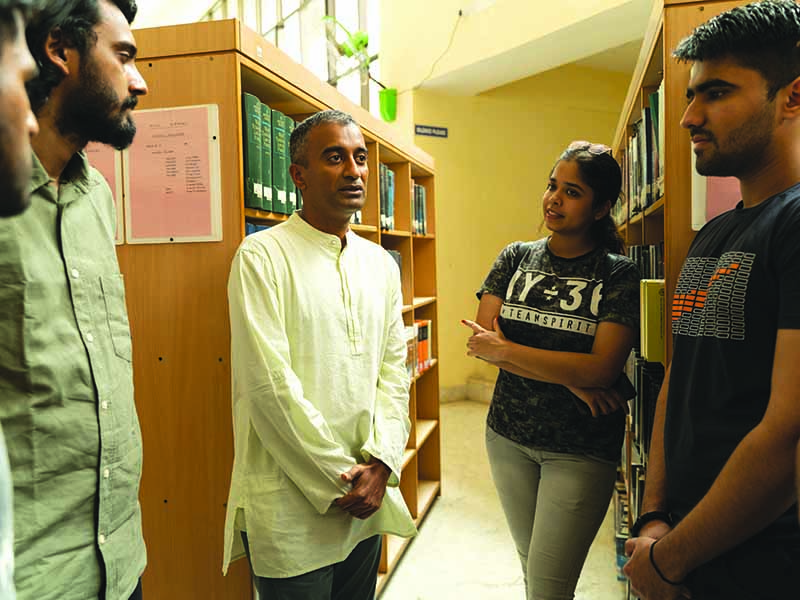India’s premier government law & humanities universities 2025-26
Despite the reputation of the country’s judiciary having hit its nadir, the number of government legal education institutions are proliferating countrywide.

NLSIU’s Krishnaswamy: comprehensive revised curriculum
Although the reputation of the country’s judiciary is at an all-time low with the judicial system reduced to a snail’s pace under the burden of 50 million pending cases, discovery of a cash mountain in the official bungalow of a senior judge of the Delhi high court on March 14 and shocking, insensitive Allahabad high court judgement in the case of attempted rape of a minor girl, legal education institutions are proliferating countrywide.
According to the Union law ministry, 1,721 colleges/universities — including 920 private colleges, 248 private universities, 383 government law colleges and 170 government varsities — are dispensing legal education programmes across India. Of them, the most highly reputed are the 26 National Law Universities (NLUs) promoted by Central/state governments pursuant to second-generation legal education reforms (1985) implemented by the Bar Council of India. Admission into NLUs is through the highly competitive national CLAT (Common Law Admission Test). In 2024, of the 68,786 school/college leavers who wrote CLAT, a mere 3,696 were admitted.
Since 2022, when your editors segregated government and private universities according to domain/subject specialisations, NLUs have dominated the league table of India’s best government law and humanities universities.
The 2025-26 league table is no different. Seven of the Top 10 ranks have been awarded by 2,100 EW sample respondents to NLUs with the National Law School of India University (NLSIU), Bengaluru (estb.1988) topping the EW league table of government law and humanities universities for the fourth year consecutively.
Dr. Sudhir Krishnaswamy, an alumnus of NLSIU and Oxford University appointed Vice Chancellor of NLSIU in 2019, is delighted that EW survey respondents have rated NLSIU #1 again with top scores under nine of the ten parameters of higher education excellence.
“We are honoured and grateful to receive this recognition for the fourth consecutive year. It confirms that we are steadily maturing into a globally leading law, social sciences and humanities multidisciplinary university. I am especially pleased that we have been awarded top scores under the parameters of curriculum and pedagogy, faculty competence, and research and innovation. This is timely appreciation because last year we initiated a comprehensive curriculum review process, and the revised curriculum is ready for implementation in the new academic year 2025-26. In addition to our Socratic seminar teaching pedagogy, we have also introduced personalised tutoring sessions. Moreover for the first time, our faculty strength has crossed 100 with NLSIU emerging as the university of choice for law and humanities. Research and innovation is also a focus area with the university’s open access journal platform hosting eight academic journals, available on our repository.nls.ac.in which has become the most visited resource for academic legal material in India,” says Krishnaswamy.
With NLSIU growing in reputation and under pressure to expand capacity, the university has recently received a land grant of seven acres and “has commenced architectural planning for a new South Campus”. “We have also initiated redevelopment of two academic blocks and sports arenas. In the next 12-24 months, the campus infrastructure will be comprehensively redeveloped to globally benchmarked standards,” promises Krishnaswamy. Currently, NLSIU has an enrollment of 1,355 students and 100 faculty.
In the EW league table of India’s best government law universities there’s no change at top table. NALSAR University of Law, Hyderabad, retains its #2 rank, followed by the Indian Law Institute (Deemed University), Delhi at #3 and National Law University (NLU), Dwarka, Delhi #4 — all retaining their 2024-25 rank.
Beyond the Top 4, there’s minor rearrangement of the seating order. National Law University (NLU), Jodhpur is ranked #5 (#6 in 2024-25). Hidayatullah National Law University, Raipur #6 (#8) tied with National Law Institute University (NLIU), Bhopal (#9) have been promoted by this year’s sample respondents.
Dr. Ram Manohar Lohiya National Law University, Lucknow has retained its #7 rank even as The West Bengal National University of Juridical Sciences (WBNUJS), Kolkata has ceded ground at #8 (#5). The Top 10 table is completed by Shri Lal Bahadur Shastri National Sanskrit University, Delhi #9 (#10) and Gujarat National Law University, Gandhinagar #10 (#13).
















Add comment